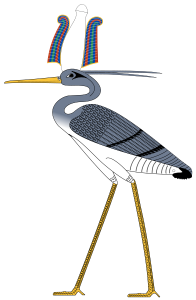 Ancient Egypt
Ancient Egypt
A heron’s call is the cry of the sacred Benu-bird (shown at left) that announced the beginning of time in an ancient Egyptian creation myth. The Benu-bird was associated with the Egyptian calendar and the idea of cyclical renewal. A heron hieroglyph represents the sun-god Ra.
A spell to transform the dead into the great Benu-bird is elaborated in The Book of the Dead.
A double-headed heron was a symbol of prosperity.
Ancient Greece
A heron was the messenger for Athena, the goddess of wisdom. Consider this passage from The Illiad (by Homer, as translated by Robert Fitzgerald):
“Off to the right along their path, Pallas Athena sent a heron gliding down the night. They could not see it passing, but they heard its cry; and heartened by that fisher bird, Odysseus prayed ‘O child of Zeus who bears the storm cloud, hear me…. tonight, befriend me most, Athena….’ These were the prayers, and Pallas Athena, Zeus’ daughter, heard them.”
The name “heron” is related to the Greek word “krizein”, which means, “to cry out or shriek”.
Aztec
In Aztec mythology, the Aztec people crawled from seven caves in the center of the earth to emerge in Aztlan, “the place of the herons.” The roots of the word Aztlan are: aztatl = “heron” and tlan(tli) = “place of.”
China
The word for heron (lu) sounds like the word for path, or way. A common charm meaning “May your path be ever harmonious.” shows a heron (path) and a lotus flower (continuous harmony).
Native America
A blue heron was a good omen to an Iroquois setting off to a hunt.
Deceased wise men were thought to return as herons.
New Zealand
To the Maori a great egret, Kotuku, symbolizes everything rare and beautiful. To say that someone is a Kotuku is a great compliment.
“Rare as the Kotuku” is a Maori proverb, because great egrets are extremely rare in New Zealand. The saying ‘He Kotuku rerenga tahi’ refers to the Kotuku as a magical bird of a single flight: a sight permitted perhaps once in a lifetime. When a person is referred to as a Kotuku Rerenga Tahi, this means that this is a great sort person who is seldom found.
The Kotuku are thought to be spirit messengers who inhabit the spirit land of Reinga. An old funeral chant ends with: “Ko to kotuku to tapui, e Tama e – Kotuku is now thy sole companion, O my son!”
